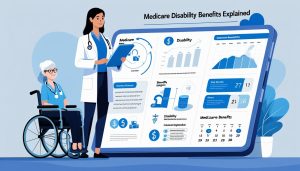Navigating Medicare eligibility can seem daunting, but understanding your options is essential for securing the coverage you need. You can check your Medicare eligibility online through the Social Security Administration’s website, where you can find the specific criteria based on your age, work history, and citizenship status. This straightforward process allows you to confidently assess your eligibility and plan your next steps.
The Modern Medicare Agency is here to simplify this journey. Our licensed agents are real people dedicated to assisting you on a one-on-one basis. They work to identify Medicare packages that align with your needs, ensuring you access quality coverage without any hidden fees.
Taking the first step to verify your Medicare eligibility can open the door to better healthcare options. With the right support, you can navigate the system effectively and secure the benefits you deserve. Whether you’re new to Medicare or nearing eligibility, The Modern Medicare Agency is here to guide you through the entire process.
Understanding Medicare Eligibility Criteria
To qualify for Medicare, you must meet specific criteria. These include age requirements, disability status, and certain qualifying health conditions. Understanding these factors is crucial in determining your eligibility and ensuring that you can access necessary healthcare services.
Age Requirements for Medicare
You become eligible for Medicare when you reach age 65. This includes people born on or before the eligibility date. If you are receiving Social Security benefits for at least four months before turning 65, you will automatically be enrolled in Medicare Part A and Part B.
If you are under 65, you can qualify if you have been disabled for 24 months or receive Social Security Disability Insurance (SSDI). It’s important to regularly check your eligibility status, especially as you approach your 65th birthday.
Disability Status and Medicare
If you are under 65, your eligibility for Medicare primarily hinges on your disability status. Specifically, you must have been receiving SSDI benefits for 24 months. After this period, you’ll automatically be enrolled in Medicare.
Certain conditions also allow immediate eligibility, such as those with end-stage renal disease (ESRD) or amyotrophic lateral sclerosis (ALS). Always ensure that you keep your records updated with the Social Security Administration to facilitate your enrollment.
Qualifying Health Conditions: ESRD and ALS
Two specific health conditions offer expedited Medicare eligibility: ESRD and ALS.
If diagnosed with ESRD, you may qualify for Medicare immediately after starting dialysis or receiving a kidney transplant. Similarly, a diagnosis of ALS allows for automatic enrollment in Medicare upon approval of Social Security benefits.
These conditions ensure that you have access to crucial healthcare resources without unnecessary delays. Understanding these criteria helps you navigate your options more effectively.
Choosing The Modern Medicare Agency for your Medicare needs gives you access to licensed agents who can help identify suitable Medicare packages tailored to your needs without any hidden fees. You will have a personal touch that makes Medicare enrollment simpler and clearer.
How to Determine If You Are Eligible for Medicare
Checking your Medicare eligibility involves several important steps. You need to assess your online information, review your work history, and verify your citizenship and residency status. Each of these components plays a crucial role in ensuring you meet Medicare’s requirements.
Using Online Tools to Check Eligibility
You can easily determine your Medicare eligibility by utilizing several online tools provided by official sources. The Social Security Administration (SSA) offers a dedicated webpage where you can create a “my Social Security” account. Through this account, you can view your eligibility status based on age, work history, and any disabilities.
Additionally, resources like the Medicare Eligibility Calculator can provide estimates of your eligibility date and potential premium amounts. These tools streamline the process, making it straightforward to get personalized information without needing to visit an office.
Reviewing Work History and Tax Contributions
Your work history and tax contributions significantly influence your Medicare eligibility. To qualify for premium-free Medicare Part A, you typically need to have worked for at least 10 years (40 quarters) and paid Medicare taxes.
You can usually find this information in your Social Security statement. If you worked for the government or served in the military, specific eligibility considerations may apply. If you’re unsure of your contributions, consider contacting The Modern Medicare Agency for guidance—they can help clarify your work history and Medicare options.
Verifying Citizenship and Residency Requirements
Another critical factor in determining your Medicare eligibility is your citizenship and residency status. To qualify, you must be a U.S. citizen or a legal resident for at least five years.
Gather documents that prove your citizenship or legal residency, such as your birth certificate, passport, or green card. If you have questions about meeting these requirements, The Modern Medicare Agency’s licensed agents can provide personalized assistance. They will walk you through the verification process, ensuring you understand what steps you need to take.
Enrollment Periods and When to Apply
Understanding enrollment periods is crucial for ensuring you enroll in Medicare on time. Missing deadlines can lead to delays in coverage and potential penalties. Here’s a clear breakdown of when you can sign up and what to consider.
Initial Enrollment Period Explained
Your Initial Enrollment Period (IEP) is a seven-month window to sign up for Medicare. It begins three months before the month you turn 65, includes your birthday month, and extends three months afterward.
For example, if your birthday is July 15, your IEP would start on April 1 and end on October 31. During this time, you can apply for Medicare Part A and Part B without facing any penalties. Enrolling on time ensures you receive coverage when you need it.
Special Enrollment Periods Due to Life Changes
If you experience significant life changes, you may qualify for a Special Enrollment Period (SEP). Events such as moving, losing other health coverage, or significant changes in your living conditions can trigger this window.
Typically, SEPs last for two months after losing coverage or moving. During this time, you can sign up for Medicare without facing penalties. It’s essential to monitor your eligibility for SEPs to avoid gaps in your coverage.
Late Enrollment and Potential Penalties
If you miss your Initial Enrollment Period and don’t qualify for a Special Enrollment Period, you may have to wait for the General Enrollment Period from January 1 to March 31 each year.
Enrolling late can result in a penalty that increases your premiums for Part B by 10% for each full 12-month period you delay enrollment. This penalty not only affects your monthly payments but can also impact your overall healthcare budget.
With The Modern Medicare Agency, you have access to licensed agents who guide you through the enrollment process. They help you identify the best Medicare packages without extra fees, ensuring you get the most suitable coverage for your needs.
Dual Eligibility and Other Assistance Programs
Understanding dual eligibility can provide significant advantages for those navigating Medicare and Medicaid. This section will explore how Medicare eligibility intersects with Medicaid and outline the benefits available to dual-eligible individuals.
Medicaid Eligibility with Medicare
If you qualify for Medicare, you might also be eligible for Medicaid, depending on your income and other factors. Medicaid acts as a safety net for low-income individuals and families, while Medicare primarily serves older adults and those with disabilities.
To qualify for Medicaid, you generally need to meet specific income and asset requirements. Each state administers its Medicaid program differently, so checking your local eligibility criteria is essential. Many individuals with limited resources can access both programs, providing critical support for medical expenses.
Dual-Eligible Benefits and Coverage Options
Being dual-eligible means you can receive additional benefits beyond what Medicare offers. This includes assistance with Medicare premiums, deductibles, and co-pays through Medicaid. Certain programs like the Qualified Medicare Beneficiary (QMB) program cover these costs entirely.
Furthermore, dual-eligible beneficiaries might qualify for the Extra Help program, which reduces prescription drug costs. This combination of Medicare and Medicaid allows for comprehensive coverage, helping you manage healthcare expenses effectively.
The Modern Medicare Agency offers personalized assistance in navigating dual eligibility. Our licensed agents are accessible for a one-on-one conversation, helping you find and understand Medicare packages that suit your needs without hidden fees.
Understanding Your Medicare Coverage Options
Navigating your Medicare coverage options is essential for ensuring you receive the healthcare benefits you need. It’s important to familiarize yourself with the types of coverage available so you can make informed decisions about your health insurance.
Original Medicare Coverage Basics
Original Medicare consists of two main parts: Part A and Part B. Part A typically covers hospital stays, skilled nursing facility care, hospice care, and some home health care. It usually doesn’t require a monthly premium if you’ve paid Medicare taxes for at least 40 quarters.
Part B focuses on outpatient care, including doctor visits, preventive services, and certain medical equipment. Most beneficiaries pay a monthly premium for Part B, which can vary based on your income. Understanding what each part covers can help you anticipate your healthcare needs better.
Medicare Advantage Plans Overview
Medicare Advantage Plans (Part C) are offered by private insurance companies and provide an alternative to Original Medicare. These plans include all the benefits of Part A and Part B and often offer additional coverage, such as vision, dental, and hearing services.
Many Medicare Advantage Plans also include Medicare Part D (prescription drug coverage), which simplifies your healthcare management. Each plan can have different costs and coverage options, so it’s crucial to compare plans based on your healthcare needs.
The Modern Medicare Agency can guide you in selecting a Medicare Advantage Plan that suits your lifestyle without hidden costs.
Medicare Part D Prescription Drug Coverage
Medicare Part D helps cover the cost of prescription medications. This coverage is available through standalone plans or as part of a Medicare Advantage Plan. Each plan has its own list of covered drugs, known as a formulary.
The out-of-pocket costs, such as deductibles, premiums, and copayments, can vary significantly between plans. Therefore, checking the drug coverage and costs is vital for ensuring you can afford your medications.
With The Modern Medicare Agency, you have access to personalized support from licensed agents who can help you navigate your options for Part D and find the best plan for your medication needs. They assist you without hidden fees, ensuring you understand your choices clearly.
Verifying and Managing Your Medicare Information
Understanding how to verify and manage your Medicare information is crucial for ensuring you receive the correct benefits and coverage. You can easily access your eligibility status and know what documents you need to confirm your Medicare enrollment.
How to Access Your Medicare Status Online
To check your Medicare status, visit Medicare.gov and log in to your account using your red, white, and blue Medicare card. If you don’t have an account, you can create one by providing personal information like your Social Security number.
Once logged in, navigate to the “My Medicare” section. Here, you can view your eligibility, check coverage details, and see what services are included. This online access makes it straightforward to stay updated on your benefits.
If you prefer personalized assistance, The Modern Medicare Agency offers licensed agents who can guide you through the process. They provide one-on-one support tailored to your specific needs, giving you confidence in your Medicare choices.
Required Documents for Eligibility Verification
When verifying your Medicare eligibility, you generally need several key documents. First, your Medicare card is essential; it includes your Medicare number, which helps identify your benefits.
You may also need to provide proof of disability benefits if applicable. This may include documentation from the Social Security Administration (SSA) confirming your status. Keeping these documents organized will facilitate a smoother verification process.
Other helpful information includes your date of birth and any previous health coverage details. Having these documents ready speeds up the verification, ensuring you don’t encounter delays in accessing your Medicare benefits.
For assistance with these processes, The Modern Medicare Agency’s agents are available to offer tailored support without extra fees.
Frequently Asked Questions
Understanding how to check your Medicare eligibility is essential. The following questions provide specific insights into the eligibility verification process, available resources, and requirements you need to consider.
How do I check my eligibility for Medicare online?
To check your eligibility for Medicare online, visit the official Medicare website. You will need to provide personal information such as your name, date of birth, and Social Security number. After submitting your details, you will receive immediate feedback on your eligibility status.
What are the steps to verifying Medicare eligibility and benefits for providers?
Providers can verify Medicare eligibility by accessing the Medicare Beneficiary Database. They should first gather the patient’s Medicare number, date of birth, and the services being requested. Then, they can use this information to enter into the system to validate eligibility and benefits.
Where can providers perform a free Medicare eligibility check?
Providers can perform a free Medicare eligibility check through the official Medicare website or using the CMS portal. Both platforms are user-friendly and allow for quick verification, ensuring that you have the right information before providing services.
What are the Medicare eligibility requirements regarding income levels?
Medicare eligibility primarily depends on age, work history, and certain health conditions. Income levels do not affect eligibility for Medicare itself but may influence your premiums for Medicare Part B and Part D.
Through which provider portal can Medicare eligibility be checked?
Eligibility can be checked through the CMS (Centers for Medicare & Medicaid Services) portal. This system allows providers to access patient information efficiently, ensuring that all relevant details are available for determining eligibility.
What is the process to check Medicare eligibility in Availity?
To check Medicare eligibility in Availity, login to your Availity account. Navigate to the eligibility and benefits section, enter the required patient information, and submit the query. The system will provide results that confirm or deny the patient’s Medicare eligibility status.
The Modern Medicare Agency is your best choice for Medicare insurance needs. Our licensed agents offer personalized support without hidden fees, ensuring you find the right Medicare packages tailored to your specifications.






